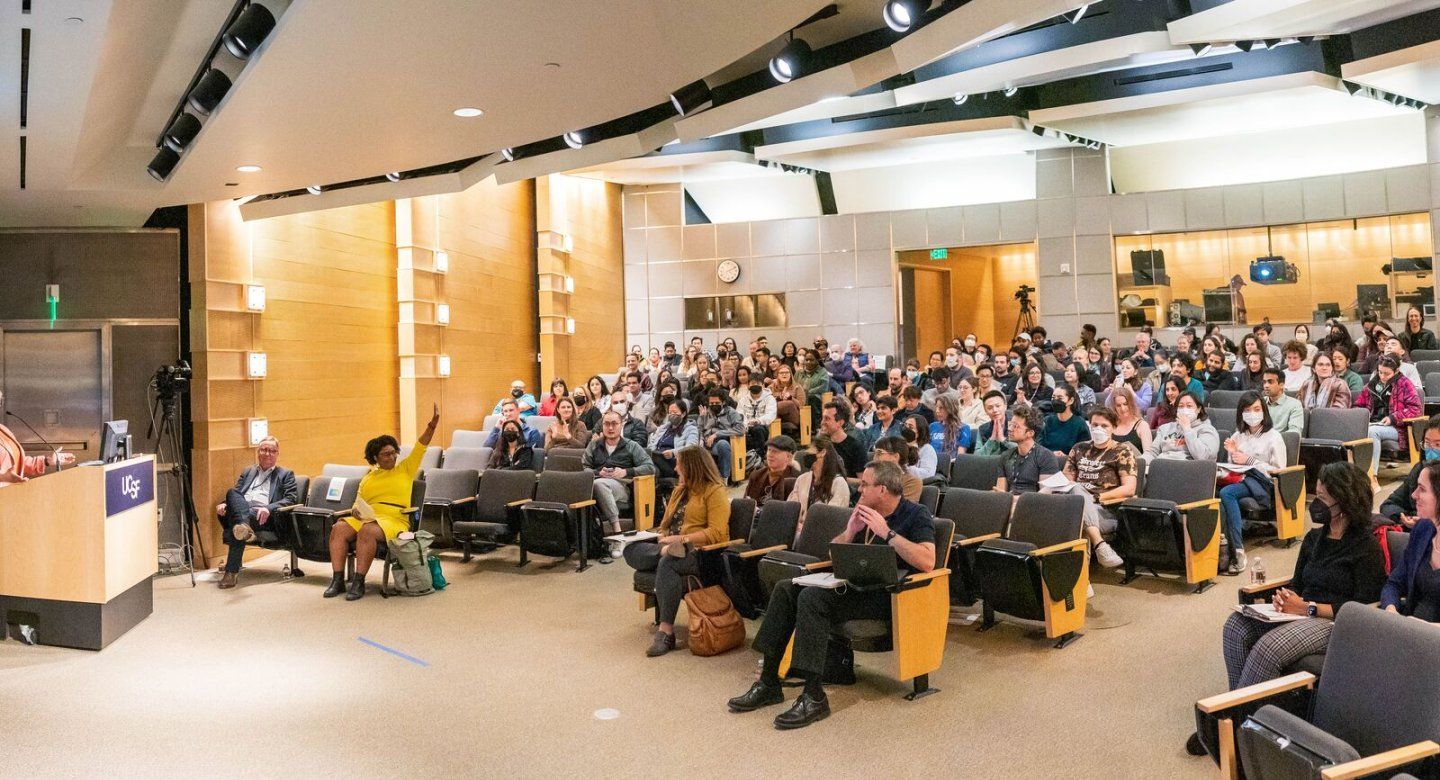Learn Without a Brain Research Wins 2023 UCSF Grad Slam
What is learning? Do organisms need a brain to learn? The habits of Stentor coeruleus, a single-celled organism that lives in ponds, show that a brain is not required for living things to learn and adapt to changing conditions.
Exactly how Stentor learns without a brain is a question that Deepa Rajan, a graduate student in UC San Francisco’s Tetrad Graduate Program, is trying to answer. Her talk on this work recently won the top prize in the 2023 UCSF Grad Slam.
Rajan was one of 10 graduate student finalists competing in this year’s UCSF Grad Slam held on April 4, in which students presented their research in three minutes or less in terms easily understood by a general audience.
Deepa Rajan presents her winning talk, “Learning Without a Brain.” Watch the full 2023 Grad Slam
This year’s event was held in person at Genentech Hall at Mission Bay and streamed live on YouTube. The 10 presenters touched on topics that included memory formation, the origins of courage, and cancer prevention and treatment.
Rajan’s talk on “Learning Without a Brain” highlighted her research with Wallace Marshall, PhD, and Adam Frost, MD, PhD, on Stentor coeruleus – a funnel-shaped filter feeder. She is investigating how Stentor is capable of habituation – or decreased response to repeated stimulation – even though it lacks a brain. She uses a device in a lab to tap Stentors over and over and analyze how they expand or contract in reaction. The single-celled organisms eventually habituate to the tapping and stop responding. She found Stentor might learn to do this using proteins that are similar to a human’s short-term memory.
“By studying habituation at the level of a single cell, we can learn more about the origins of intelligence across different life forms,” Rajan said. She hopes it will lead to a more fundamental cellular understanding of human disorders of habituation such as obsessive-compulsive disorder and attention-deficit/hyperactivity disorder.
“For me, science communication is core to the research endeavor and not something separate, especially because the language we use to describe phenomena shapes the way we think about them,” Rajan said when asked about the success of her presentation.
A panel of judges voted for Rajan as the first-prize winner.
The People’s Choice Award
In addition to the judges’ award, the in-person and remote audiences voted for Rajan to receive the People’s Choice Award. She took home $4,000 for first prize and $750 for the People’s Choice Award.
“I’m really grateful to have received two awards, and it is a testament to the support I have received at UCSF,” Rajan said. “Leading up to the Grad Slam, what I most looked forward to was being surrounded by friends and colleagues who have helped me along the way, also knowing that still more supporters were watching online.”
Rajan will go on to represent UCSF at the UC system-wide Grad Slam on May 5.
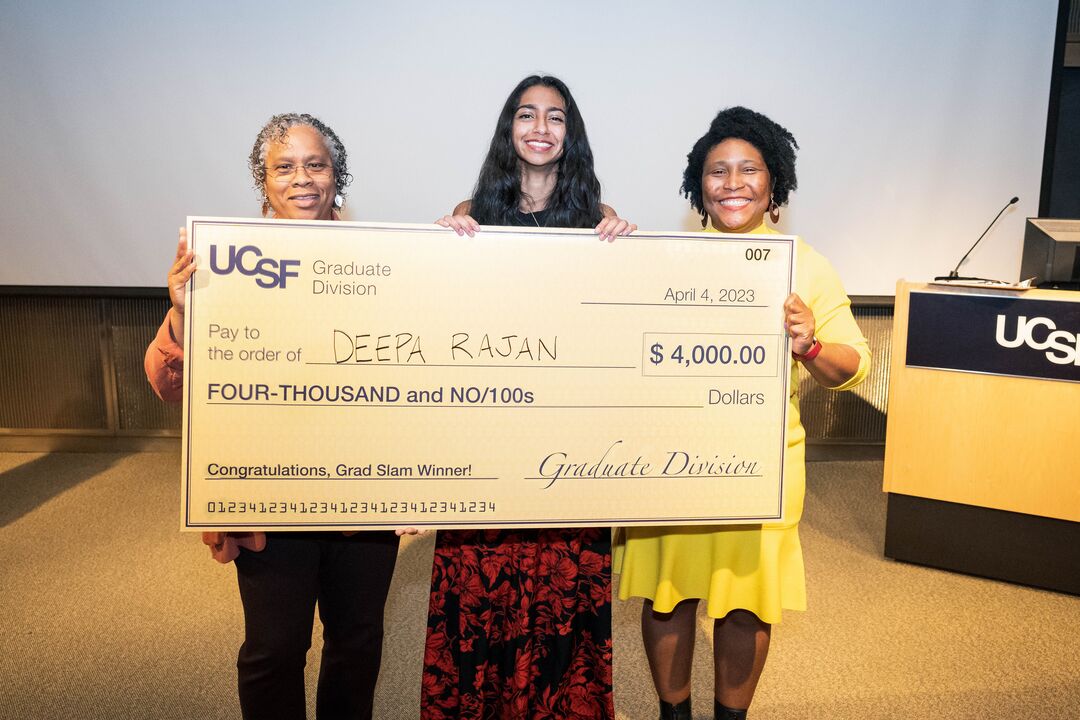
Better Health Through Better Health Equity
Jaysón Davidson, a graduate student in the Pharmaceutical Sciences and Pharmacogenomics Program at UCSF, took second prize and received $2,000 for his talk on “Improving Health Equity Bit by Bit.” Davidson described his research on how analyzing social determinants of health could help make health care more equitable.
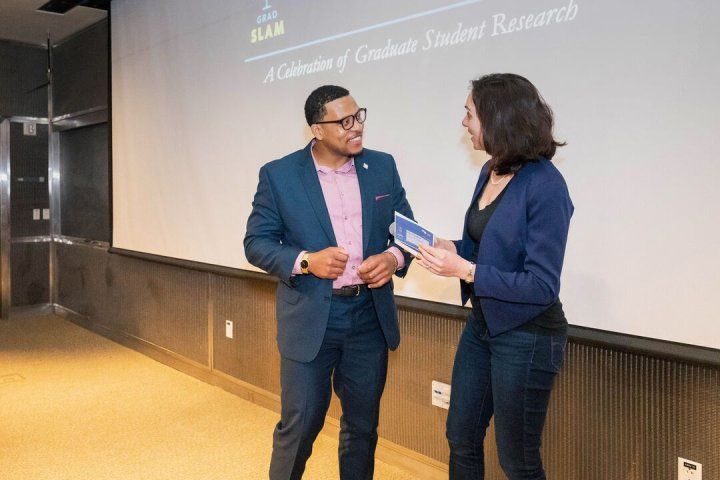
Davidson uses a dataset of nearly 9 million anonymized patients’ health data and their home addresses to better understand associations between diabetes and social determinants of health – or nonmedical factors that influence health outcomes, including a person’s income, education and employment. He built artificial intelligence models to analyze the data and found that diabetes patients from lower-income neighborhoods were prescribed cheaper, possibly less effective treatments. The same patients also waited longer to visit the doctor than patients from higher-income neighborhoods. He is exploring what causes these disparities and how they can be addressed by diving deeper into the data.
Winning second prize at Grad Slam “showed me that I am walking in the right steps of using my gift to communicate my science to the masses in the future,” Davidson said.
Can We Stop Neurodevelopmental Disorders Before They Start?
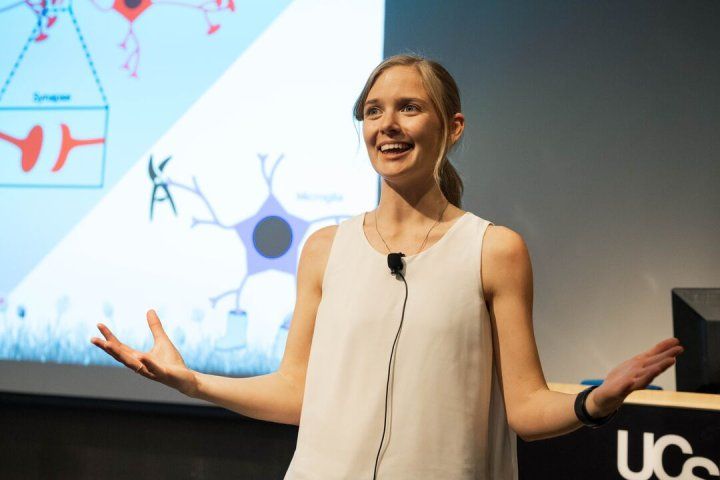
Olivia Teter, a graduate student in the Bioengineering Program at UCSF, won third prize and received $1,000 for her talk on “Nipping Neurodevelopmental Disorders in the Bud.” She used a metaphor to explain her research, suggesting that immune cells called microglia act like gardeners that prune synapses in the brain. This pruning of synapses is normal and necessary to form specialized neural circuits.
But in people with neurodevelopmental disorders, microglia do either too much or too little pruning. Her hypothesis is that in people with neurodevelopmental disorders, microglia are struggling to find the right synapses to prune. She identified a signal that microglia use to find synapses and showed that neurodevelopmental disorders can hijack this signal. In future work, she aims to discover how drugs might promote proper pruning.
“Participating in Grad Slam has been an amazing opportunity to exercise and grow my communication skills,” Teter said. “The Graduate Division provided multiple coaching and learning opportunities. I am grateful for and proud of the growth they helped me achieve.”
The other finalists in this year’s competition, in order of appearance, were:
Sophia Guldberg (Biomedical Sciences Program)
“Cancer Can’t Breathe (or Grow) with No Aire”
Evelyn Hernandez (Tetrad Program)
“Sending the Right Signal – How Cells Talk to and Interpret Each Other”
Victoria Sayo Turner (Neuroscience Program)
“Be Bold, Little Mouse: Finding Courage in the Brain”
Mashel Fatema Saifuddin (Tetrad Program)
“Memoirs of a Worm”
Saumya Bollam (Biomedical Sciences Program)
“An Extra Nudge in the Direction of Cancer”
Benjamin Wheeler (Biomedical Sciences Program)
“Malat1 is a Spongy RNA That Helps the Immune System Remember”
Canice Christian (Global Health Sciences Program)
“We Have the Power to Stop HIV”
The 10 finalists were selected by a panel of screening judges who reviewed more than 30 initial video entries.
The live event final judges were Abby Buchwalter, PhD, assistant professor at the Cardiovascular Research Institute, Dan Lowenstein, MD, the Robert B. and Ellinor Aird Professor of Neurology at UCSF; Florie Mar, PhD, global medical science director for medical affairs at Genentech and founder and president of Youreka Science; Elise Marsan, PhD, a postdoc and first prize winner of Postdoc Slam 2022; and Carla Washington, PhD, Graduate Division Alumni Association president at UCSF.
Lowenstein told the student finalists, “Listening to all these talks is so inspiring because of the way your work is going to translate into improving the lives of the people who come to seek health care at UCSF. Learning about the work that you’re doing makes me as hopeful as I’ve ever been.”
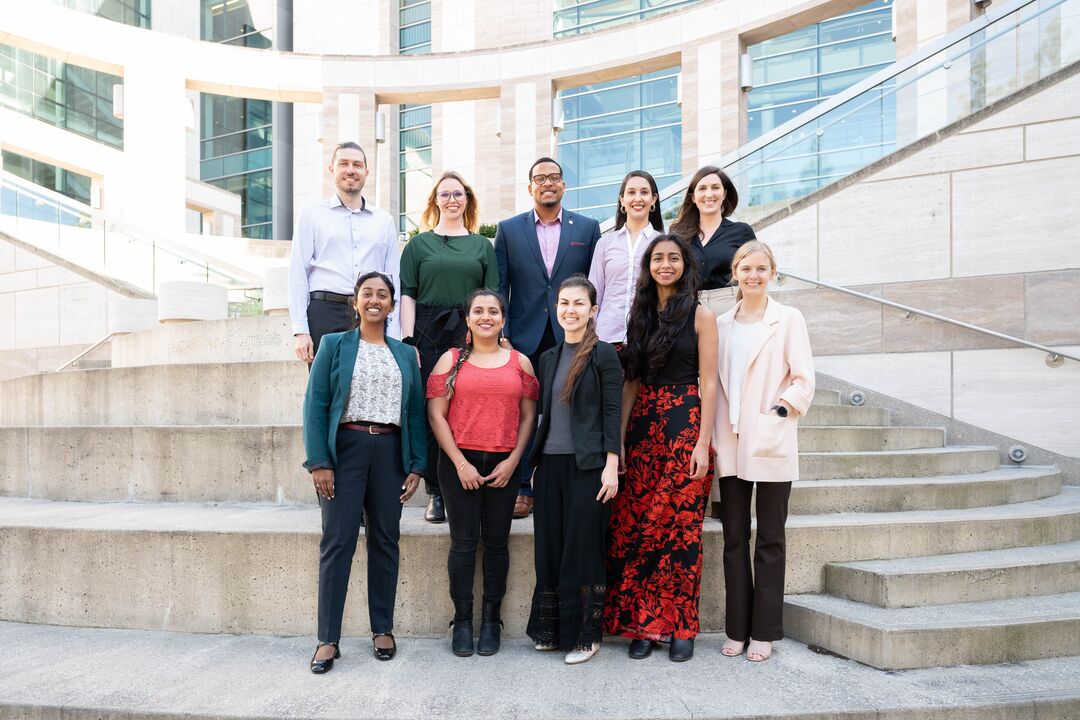
Top row, from left: Benjamin Wheeler, Biomedical Sciences; Sophia Guldberg, Biomedical Sciences; Jaysón Davidson, Pharmaceutical Sciences and Pharmacogenomics; Evelyn Hernandez, Tetrad; and Canice Christian, Global Health Sciences. Bottom row, from left: Saumya Bollam, Biomedical Sciences; Mashel Fatema Saifuddin, Tetrad; Victoria Sayo Turner, Neuroscience; Deepa Rajan, Tetrad; Olivia Teter, Bioengineering. Photo by Susan Merrell.
